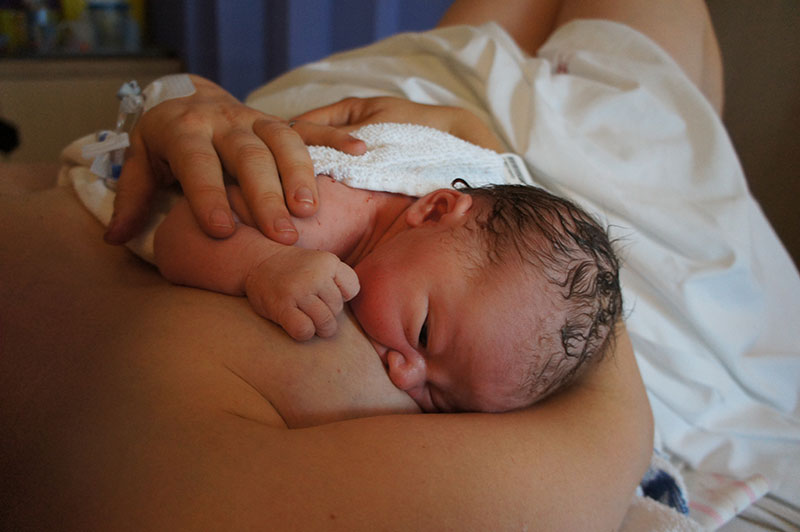Breastfeeding and cuddles with mum and partner are a big comfort to little people out in the big world.
Responding to your baby keeps their stress levels low and raises levels of the love hormone oxytocin. Oxytocin helps calm your baby and makes them feel secure and loved. It's also a fertiliser for the brain, helping your baby's brain to grow.
Breastfed babies cannot be overfed so you can use breastfeeding to soothe your baby and as a way of spending time together, or having a rest whenever you both want.
Responding to your baby
The first 1,001 days of your baby's life, from conception to their second birthday, are crucial for their brain development. During this time, their brain grows faster than at any other point in their life. A baby's brain has 100 billion brain cells at birth, but not many connections (these are known as synapses) between them. These connections are wired up by love, affection and closeness.
When you offer a warm and loving response to your baby’s needs, you are laying the building blocks for their future health and happiness.
Each time you talk to them, sing to them, look into their eyes, respond to sadness with warmth, love and reassurance you are meeting their needs.
Other moments that help a baby make healthy brain connections include being touched, stroked, rocked, fed, cuddled and comforted.
This is an important time not just for their physical development, but also for learning about their emotions and how your baby interacts with others.
You can't spoil a baby with too many cuddles. In fact all that interaction with you will have some amazing benefits.
- Releases the hormone oxytocin in you and your baby – promoting a happier baby and lowering the risk of you developing postnatal depression
- Reduces stress hormone cortisol in your baby, boosting their brain development.
- Helps your baby know you will respond to their needs for food, comfort, and security.
- Supports the development of your baby’s speech and language skills.
How can you respond to your baby?
- Respond to their cues for food or comfort: when they need a nappy change, when they feel too hot or cold, or if they’re unwell.
- Hold your baby close to your face. Your baby's vision is limited in the early weeks so being in close contact helps them focus and feel secure.
- Skin-to-skin contact and holding your baby close. Babies don't realise they are separate from their caregiver for the first few months, so holding them close offers reassurance and security.
- Talk and sing to your baby. Communication is key, even if they can’t respond yet, they will also recognise the voices of those closest to them from before they were born.
- Responding to your baby when they cry. Responding as soon as possible helps build trust and ensures your baby feels cared for.
Skin-to-skin and the first feed
Hold your baby against your skin as soon as possible after the birth and for as long as you want. Your baby will be able to hear the comforting sound of your heartbeat and voice, which will help calm and relax them. It will also give you both the chance to rest, keep warm and get to know each other.
Babies have strong instincts to feed. They're able to see and smell the nipple and latch themselves with a little help from you. The latch might not be perfect at first and you may need some support to feel comfortable. Skin-to-skin contact is the ideal way to give that support.
Breastfeeding and skin-to-skin contact release a hormone called oxytocin in you and your baby. This hormone is often called ‘the love hormone’. It helps you and your baby feel close and connected to each other. Bonding is a gradual process. It can take days, weeks or months to build that special closeness.
Skin-to-skin contact also helps:
- regulate your baby's temperature, breathing and heart rate
- boost your milk supply and stimulate your baby's feeding instincts
- you bond with your baby
- release the hormone oxytocin – your body's natural feel-good chemical
- build your baby's immunity to infections.

Watch Cameron and his mum Angela enjoying their first feed together after spending time skin-to-skin.
Breastfeeding allows you and your baby to spend time together and can give you both a rest whenever you feel you need one.
Skin-to-skin helps to increase milk supply and gives you and your baby the time to practice feeding. A great way to do this is to have a ‘babymoon’ together. You can cuddle up in bed, for example, and enjoy all the baby snuggles. Once you’re both at home, you can settle on the sofa with a box set.
 Take a look at the Lullaby Trust's safer sleep advice for more tips on how to enjoy this special time.
Take a look at the Lullaby Trust's safer sleep advice for more tips on how to enjoy this special time.
Skin-to-skin cuddles from dads and partners will strengthen the bond between them while helping your baby feel calm and secure.
'Meeting Baby for the first time' is a video from UNICEF Baby Friendly about the benefits of skin-to-skin in the golden hour after birth.
Special-care babies and skin contact
If your baby needs special care after they're born, it may not be possible for you to hold your baby straight away. The maternity team will support you to gently touch your baby or hold their hand.
Any amount of touch will be a comfort to your baby. Remember that you will be able to enjoy lots of skin-to-skin as soon as your baby is well enough. Take a look at our 'Baby arrives early or unwell' page for more information.
Skin-to-skin contact at home
Continue having skin-to-skin contact when you're at home, especially in the first few days and weeks (and months if you are happy to continue).
It will help calm your baby when they are hungry or upset, and will help your baby form a strong attachment to you.
Resources for you
Kent and Medway families can access an online 'Understanding your child' antenatal course.
- Help you build a loving and close relationship with your baby even before they arrive.
- Cover everything you need to know about pregnancy, labour and birth and beyond.
Go to ‘In Our Place’ and apply the access code Invicta to register for an account.
Tara and baby Casey, from Canterbury
"Breastfeeding is the hardest but most rewarding thing I have ever done. I’m so pleased that I found support when I needed it to help me give my baby the best start."
